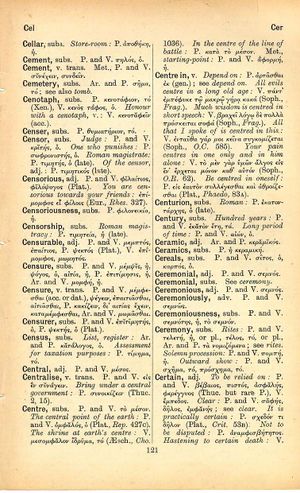census: Difference between revisions
προγράψαντες οὖν τά τε θεωρήματα καὶ τὰ ἐπιτάγματα τὰ χρεῖαν ἔχοντα εἰς τὰς ἀποδείξιας αὐτῶν μετὰ ταῦτα γραψοῦμές τοι τὰ προκείμενα → having therefore written at the beginning the theorems and the postulates that are necessary for their proofs, we will then write out for you the propositions
(CSV3) |
(6_3) |
||
| Line 5: | Line 5: | ||
<b class="b2">Assessment for taxation purposes</b>: P. [[τίμημα]], τό. | <b class="b2">Assessment for taxation purposes</b>: P. [[τίμημα]], τό. | ||
}} | |||
{{Lewis | |||
|lshtext=<b>census</b>: a, um, Part., from 1. [[censeo]].<br /><b>census</b>: ūs, m. 1. [[censeo]].<br /><b>I</b> A registering and rating of Roman citizens, [[property]], etc., a [[census]]; cf. Liv. 1, 42, 5; Dig. 50, 15, and the compendiums referred to under [[censor]]: habere, Cic. Verr. 2, 2, 53, § 131: agere, Liv. 3, 22, 1; 40, 46, 8; Suet. Aug. 27; id. Tib. 21: facere, Gell. 10, 28, 1: censere, cf. [[censeo]]: censu prohibere, to [[refuse]] one [[admittance]] [[into]] the [[lists]] of citizens, Cic. Sest. 47, 101; so, censu excludere, Liv. 45, 15, 4: [[manumissio]] censu, i. e. [[when]] a [[slave]] [[was]] enrolled in the [[census]] at the [[request]] of his [[master]], Just. Inst. 1, 5, 1.— Hence,<br /><b>II</b> [[Meton]].<br /> <b>A</b> The [[register]] of the [[census]], the [[censor]]'s [[lists]], P. Afr. ap. Gell. 7, 11, 9; Cic. Balb. 2, 5; id. Arch. 5, 11; id. Cael. 32, 78; Liv. 39, 44, 2; Dig. 50, 15, 4; 22, 3, 10.—<br /> <b>B</b> The registered [[property]] of Roman citizens: [[census]] senatorum (800,000 sesterces), Suet. Aug. 41; id. Vesp. 17: [[census]] [[equester]] (400,000 sesterces), id. Caes. 33; id. Aug. 40; cf. Juv. 14, 326.—<br /> <b>C</b> Wealth, [[riches]], [[property]], possessions, in gen. ( = [[divitiae]], [[opes]]): [[homo]] [[egens]], [[sine]] censu, Cic. Fl. 22, 52; so Hor. C. 2, 15, 13; id. S. 2, 3, 324; Ov. F. 1, 217; id. M. 3, 588; 8, 846; Plin. 14, prooem. § 5; Tac. A. 2, 37; Suet. Ner. 38; 44 al.: [[exiguus]], Hor. Ep. 1, 1, 43: [[tenuis]], id. ib. 1, 7, 56: [[opimo]] onerare digitos, Plin. 33, 1, 6, § 22.—Poet., = [[pretium]], munera, [[rich]] presents, gifts, Ov. M. 7, 739.—<br /> <b>2</b> Trop.: censu [[Tullius]] oris (by [[eloquence]]) Emeritus [[caelum]], Manil. 1, 792; cf. id. 1, 12; 3, 71. | |||
}} | }} | ||
Revision as of 08:24, 13 August 2017
English > Greek (Woodhouse)
subs.
List, register: Ar. and P. κατάλογος, ὁ.
Assessment for taxation purposes: P. τίμημα, τό.
Latin > English (Lewis & Short)
census: a, um, Part., from 1. censeo.
census: ūs, m. 1. censeo.
I A registering and rating of Roman citizens, property, etc., a census; cf. Liv. 1, 42, 5; Dig. 50, 15, and the compendiums referred to under censor: habere, Cic. Verr. 2, 2, 53, § 131: agere, Liv. 3, 22, 1; 40, 46, 8; Suet. Aug. 27; id. Tib. 21: facere, Gell. 10, 28, 1: censere, cf. censeo: censu prohibere, to refuse one admittance into the lists of citizens, Cic. Sest. 47, 101; so, censu excludere, Liv. 45, 15, 4: manumissio censu, i. e. when a slave was enrolled in the census at the request of his master, Just. Inst. 1, 5, 1.— Hence,
II Meton.
A The register of the census, the censor's lists, P. Afr. ap. Gell. 7, 11, 9; Cic. Balb. 2, 5; id. Arch. 5, 11; id. Cael. 32, 78; Liv. 39, 44, 2; Dig. 50, 15, 4; 22, 3, 10.—
B The registered property of Roman citizens: census senatorum (800,000 sesterces), Suet. Aug. 41; id. Vesp. 17: census equester (400,000 sesterces), id. Caes. 33; id. Aug. 40; cf. Juv. 14, 326.—
C Wealth, riches, property, possessions, in gen. ( = divitiae, opes): homo egens, sine censu, Cic. Fl. 22, 52; so Hor. C. 2, 15, 13; id. S. 2, 3, 324; Ov. F. 1, 217; id. M. 3, 588; 8, 846; Plin. 14, prooem. § 5; Tac. A. 2, 37; Suet. Ner. 38; 44 al.: exiguus, Hor. Ep. 1, 1, 43: tenuis, id. ib. 1, 7, 56: opimo onerare digitos, Plin. 33, 1, 6, § 22.—Poet., = pretium, munera, rich presents, gifts, Ov. M. 7, 739.—
2 Trop.: censu Tullius oris (by eloquence) Emeritus caelum, Manil. 1, 792; cf. id. 1, 12; 3, 71.

